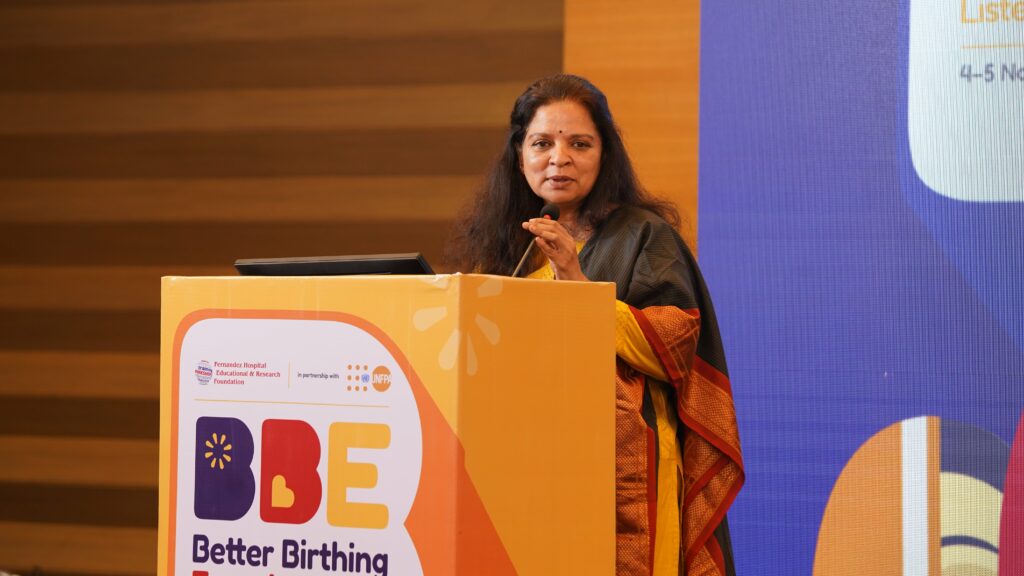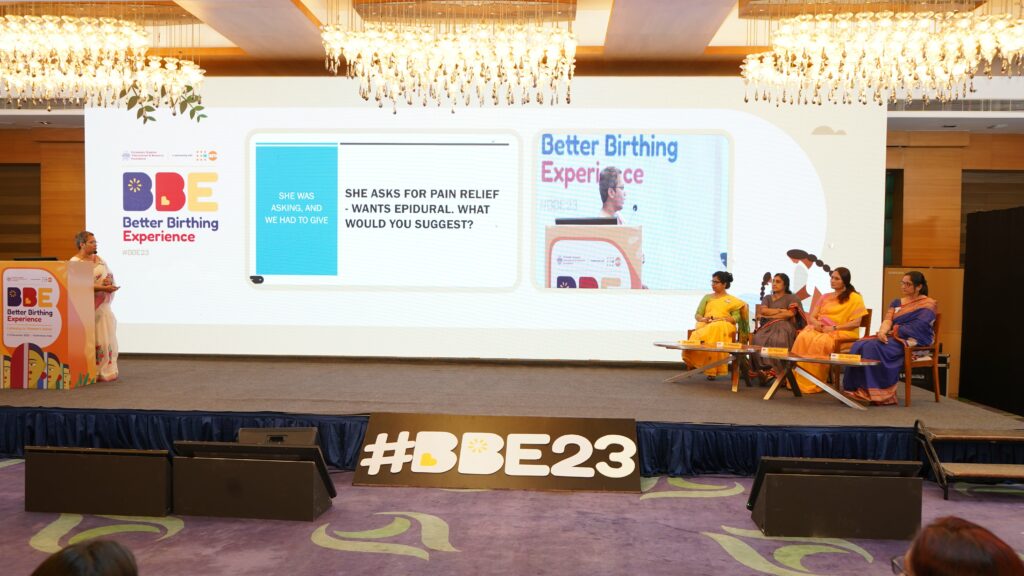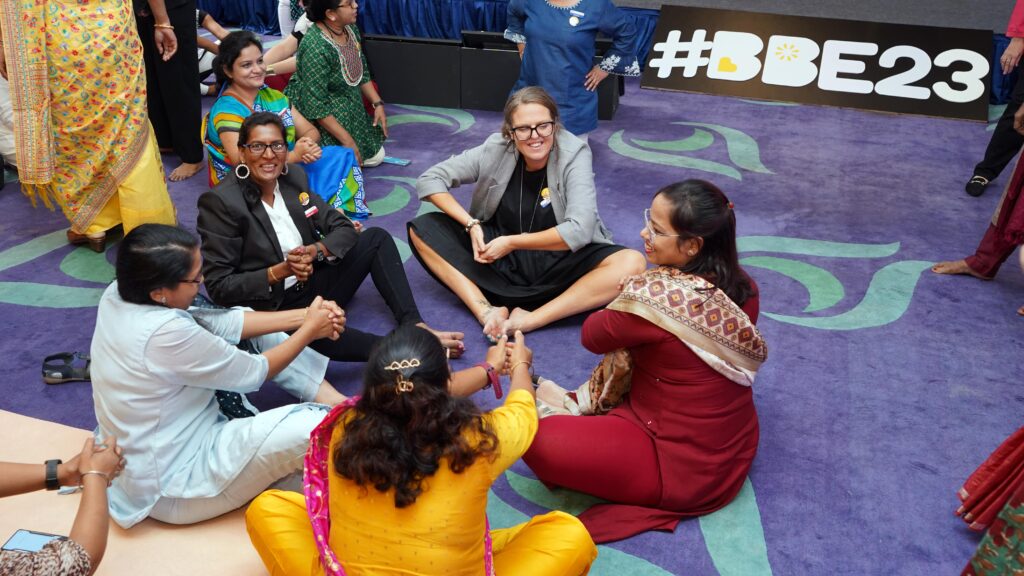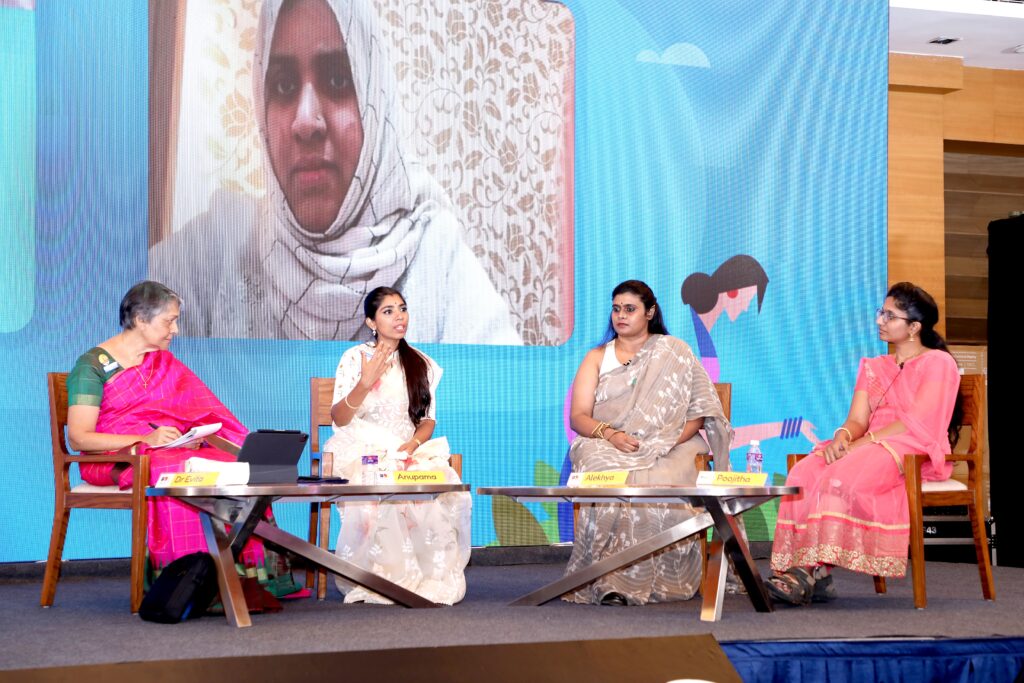On Day 2 of the Better Birthing Experience Conference, delegates and faculty delved deep into thought-provoking panel discussions on reducing unnecessary interventions. Talks and discussions ranged from how to offer VBACs, delayed cord clamping, breech births, and perinatal mental health education. The conference encapsulated a rich tapestry of contemporary childbirth practices and, most importantly, how birth professionals need to listen to women’s voices. Moreover, the significance of culturally appropriate childbirth education took centre stage, affirming the holistic approach towards fostering optimal birthing experiences.
In this blog, we put the spotlight on the diverse talks and panel discussions that marked Day 2 of the Better Birthing Experience conference.
If you haven’t already seen our Day 1 blog recap of the conference, be sure to check it out.
The Fourteenth Dr Lourdes C. Fernandez Oration

Ms Karuna Vakati, an IAS officer, currently serving as the Secretary at the Department of Education in the Government of Telangana, delivered the 14th Dr Lourdes C. Fernandez Oration on Telangana’s remarkable journey into midwifery. In her oration, Karuna traced the origins of this transformative initiative, highlighting how it all began with Fernandez. She eloquently described Telangana’s Midwifery Journey as a testament to progressive healthcare practices. She emphasised the crucial role of Fernandez, UNICEF, and the Government of Telangana in laying the foundation for improved maternal and newborn health in the region.
Can we reduce unnecessary medical interventions?

The panel discussion was led by senior consultant Dr Nuzhat Aziz, who heads Fernandez’s Obstetric Emergency Department, and had a stellar panel, comprising Dr Malathi Ponnuru, Consultant Obstetrician and Gynaecologist, Andhra Pradesh Medical Council; Sheetal Samson, Professional Midwife, and National Midwifery Educator, Dr Vijaya Krishnan, Certified Professional Midwife (CPM), co-founder-The Sanctum, Natural Birth Centre and Dr Jogitha Unni, Obstetrician and Gynaecologist, Fernandez Hospital. Each panellist discussed the challenges and opportunities when it comes to reducing medical interventions in their settings.
Vaginal Birth After Caesarean (VBAC)
Dr Vijaya Krishnan’s talk on VBACs focused on how it is crucial for women who have previously undergone a caesarean section. VBACs allow women to have a vaginal birth for their subsequent pregnancies, reducing the need for surgical interventions and the potential complications associated with multiple caesarean deliveries. Throughout the programme, participants were guided through comprehensive counselling sessions, receiving in-depth information about the risks and benefits associated with VBAC. They were educated about the factors influencing successful VBAC, including uterine rupture, maternal age, and the interpregnancy interval. By addressing their concerns and providing factual details, participants felt empowered and informed about the birthing options, leading to reduced anxiety and increased confidence in the ability to achieve a successful VBAC.
Term Breech Births
The session was followed by a talk on Breech Births by Kate Stringer. Kate is a Consultant Midwife at the Surrey and Sussex NHS Trust. She has extensive experience in education, training, clinical practice, midwifery-led care, and public health initiatives in the UK and India. In her talk, she focused on identifying the characteristics based on the current evidence concerning fetal positions, the mechanisms of breech birth and characteristics of breech labours. This is to increase care providers’ knowledge in the management of women in labour with a breech-presenting fetus.

Delayed Cord Clamping
Dr Nuzhat Aziz, who heads Fernandez’s Obstetric Emergency Department, delivered an insightful talk on delayed cord clamping during the conference. She emphasised why delay in clamping the umbilical cord has been linked to notable advantages for premature babies. With a blend of expertise and passion, she illuminated the significance of this practice in childbirth. She elucidated the scientific rationale behind delayed cord clamping and its role in promoting a smoother transition for newborns. Her compelling presentation inspired attendees and underscored this practice’s importance in facilitating a healthier start for infants.
Physiological Third Stage
Ms Sheetal Samson, Professional Midwife and National Midwifery Educator at Fernandez Hospital, explained how, in a physiological third stage of labour, you wait for the placenta to arrive on its own. It is the duty of the midwife to wait to cut the umbilical cord after the baby is born so that oxygenated blood may flow from the placenta to the child.
Postpartum Mental Health
The postpartum period, encompassing pregnancy, can be emotionally challenging for many parents. Dr Shubangi Dere offered valuable guidance on recognising and addressing issues like prenatal and postpartum depression and anxiety, empowering health providers to prioritise the mental well-being of pregnant mothers.
Culturally Appropriate Childbirth Education
Why does family matter in childbirth education? This essential question forms the core of Anupama Kumar Vijayanand’s talk. She is a certified childbirth educator, doula, and the founder of Vriksham Pregnancy Care. She emphasised the pivotal role of family in the birthing process and highlighted the significance of childbirth education for fathers and in-laws. Moreover, she delved into the evolving beliefs surrounding childbirth, acknowledging the dynamic shift in perceptions and practices over the years. Understanding these changing perspectives is fundamental in tailoring childbirth education to meet the diverse cultural needs and preferences of today’s families.
Listening to Women’s Voices

The panel discussion was led by Dr Evita Fernandez, the Managing Trustee of Fernandez Hospital Educational and Research Foundation (FHERF). The panel comprised four women with varied birthing experiences – some were traumatic, and the others very blissful. All the women agreed that birth trauma significantly altered their mental health, but they wanted to share their experiences so others could learn from it.
Master Class on Breech Births
Day 3 of the Better Birthing Experience conference was the Master Class on Breech Births by Kate Stringer. The class had over 150 participants from across India and helped participants gain a thorough understanding of how to facilitate breech deliveries.
